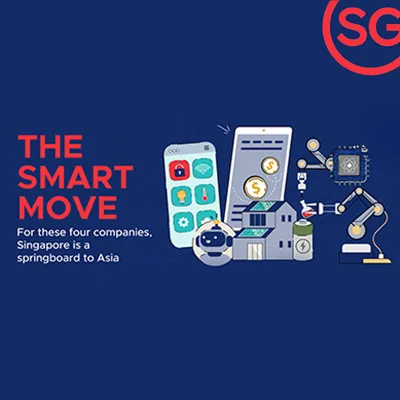Leading companies can benefit from Singapore’s strategic location, stability and conducive business ecosystem to access Asia’s growth opportunities. Southeast Asia is projected to become the fourth-largest economy in the world by 2030 and the 10 ASEAN member states are working together to remain an open, integrated and innovative area for trade, having eliminated or reduced import duties on almost all tariff lines.
The Singapore government recently introduced new initiatives and policies – for a wide range of activities spanning R&D and innovation, AI, sustainability, regional expansion, and more – to help drive business growth, strengthen competitiveness, and enhance workforce resilience. Moves are also being made to enhance regulatory efficiency and ease the compliance burden for businesses – for example, the government will increase the validity period of regular businesses licences to a minimum of three years, where possible.
Here’s a recap from Budget 2025 and the subsequent Committee of Supply debates:
1. Helping businesses tackle cost pressures and resource constraints
New 50 per cent Corporate Income Tax rebate – This supports companies’ cash flow needs, capped at S$40,000 per company for the Year of Assessment 2025. Companies which are less profitable can receive a minimum benefit of S$2,000 via a cash grant, provided they are active and have at least one local employee. [Read about the full suite of tax announcements.]
Enhanced Progressive Wage Credit Scheme – Co-funding of wage increases for lower-income workers will rise to 40 per cent in 2025 (from 30 per cent) and 20 per cent in 2026 (from 15 per cent). This allows companies to uplift wages with less burden on their bottom line.
Extended and Enhanced Land Intensification Allowance (LIA) – Offsets tax payable on qualifying capital expenditure incurred for construction or renovation of a qualifying building or structure. This will support related companies seeking to locate activities in a single site, facilitating space optimisation, operational integration, and economies of scale. More details will be released in Q3 2025.
In parallel, JTC has also announced enhancements to the Industrial Land Lease Framework to offer longer lease tenures and more flexibility in lease renewals.
2. Prioritising R&D and innovation to grow strong enterprises
Singapore has committed S$25 billion to R&D through the Research, Innovation, and Enterprise (RIE) 2025 plan from 2021 to 2025, with S$3 billion injected last year to deepen capabilities in new growth areas across advanced manufacturing, sustainability, and digital economy.
New Tax Deduction for Innovation Activities under an approved cost-sharing agreement (CSA) – A 100 per cent tax deduction will be granted for payments under an approved CSA for innovation activities, supporting companies with substantive innovation and profit centre responsibilities in Singapore. More details to be released by Q2 2025.
Additional S$3 billion to the National Productivity Fund (NPF) to boost high-value investments – The NPF supports enterprises to raise productivity and skills levels and drives investment in specific sectors in Singapore. With the top-up, Singapore will attract high-value technology investments, improve business productivity, and train workers to fuel economic growth engines, particularly in new frontier areas such as artificial intelligence and quantum computing.
New S$500 million national semiconductor R&D fabrication facility for companies to build new capabilities – Established under the National Semiconductor Translation and Innovation Centre, this facility will have an initial focus on advanced packaging. It will offer state-of-the-art cleanroom infrastructure and industry-grade tools, as well as translational research and fabrication expertise. Semiconductor companies can tap on this shared platform to scale and translate their R&D efforts to build new capabilities, develop, and commercialise globally-competitive technologies.
New S$500 million to boost biomedical research infrastructure and foster collaboration – This will promote closer collaboration and integration of the country’s biomedical research activities among researchers, industry partners, and educational institutes. A*STAR will also introduce new biopharma manufacturing programmes with its partners – the Singapore Cell Therapy Advanced Manufacturing Programme 2.0 (STAMP 2.0) and the Process Accelerator for Cell Therapy Manufacturing (PACTMAN).
Enhanced Tax Deduction for Employee Equity-Based Remuneration (EEBR) plans – From Year of Assessment 2026, tax deductions will be allowed for new shares issued by a holding company under an EEBR plan, in addition to treasury shares or previously-issued shares transferred to employees. This provides flexibility for companies to design competitive remuneration packages that can attract talent for their activities in Singapore.
Learn more about the Ministry of Trade and Industry Committee of Supply Highlights
3. Strengthening Singapore’s advantage in Artificial Intelligence (AI)
In 2024, Singapore established over 26 AI Centres of Excellence (CoEs) to drive advancements in AI innovation and adoption as well as expanded the pool of AI practitioners by nearly 25 per cent, marking significant progress towards the goal of growing this talent base from under 5,000 to 15,000 within five years.
New S$150 million Enterprise Compute Initiative (ECI) for companies to develop AI capabilities – Companies on their digital transformation journey can partner with major cloud service providers like Google, Microsoft, and Amazon Web Services (AWS) to access AI tools and computing power, as well as expert consultancy services.
More AI training for workers – Singapore will enhance initiatives under IMDA’s TechSkills Accelerator (TeSA) by increasing company-led training opportunities and exploring ways to scale up the AI Apprenticeship Programme in collaboration with AI Singapore. Additionally, SkillsFuture will introduce new AI and generative AI content into its curriculum, empowering workers across all sectors to boost productivity through tools such as ChatGPT and CoPilot.
Learn more about the Ministry of Digital Development and Information Committee of Supply Highlights
4. Boosting skills upgrading and workforce transformation
Singapore is helping the workforce upskill to take on jobs of the future and also improving companies’ access to highly-skilled complementary foreign talent.
New SkillsFuture financial support for mid-career Singaporeans and jobseekers – First, the SkillsFuture mid-career training allowance provides Singapore Citizens aged 40 and above with a monthly training allowance to partially offset the loss of income or incidental training expenses as they take time off from work to pursue training. Second, the SkillsFuture Jobseeker Support scheme provides temporary financial support of up to S$6,000 over six months to involuntarily unemployed individuals to support them in finding a job.
New SkillsFuture Workforce Development Grant (WDG) – The new simplified application process will consolidate schemes administered by Workforce Singapore (WSG) and SkillsFuture Singapore (SSG), enabling companies to easily access a comprehensive range of workforce development support via a single application channel. The WDG will also provide enhanced funding support for job redesign activities to a rate of up to 70 per cent.
Redesigned SkillsFuture Enterprise Credit – Eligible companies will receive a S$10,000 credit to offset out-of-pocket expenses for workforce transformation initiatives. Companies can now use these credits to directly immediately offset the costs, rather than do so on a reimbursement basis.
New Nurturing Singapore Global Leaders – Singapore is intensifying efforts to groom the next generation of Singapore global leaders by expanding overseas career development opportunities, enhancing transition support, and strengthening leadership networks. To ease relocation, Singapore will improve overseas transition support for Singaporeans and their families. This will be done through the Singapore Leaders Network (SGLN), which will be enhanced to scale up networking events and mentorship opportunities.
Changes to S Pass minimum qualifying salary – Singapore has adjusted the S Pass qualifying salary, moderating the increase from S$3,150 to S$3,300. For the Financial Services sector, the qualifying salary will rise from S$3,650 to S$3,800. These changes will take effect for new S Pass applications starting 1 September 2025 and for renewal applications expiring from 1 September 2026 onwards. Additionally, the S Pass levy rate will be standardised at S$650 for all holders from 1 September 2025.
Changes to Work Permit framework – Firstly, the maximum employment restrictions for Work Permit holders will be removed, and the maximum employment age will be increased to align with the current local retirement age of 63. MOM will also streamline the age limit for new Work Permit applications, pegging it to two years below the local retirement age, i.e. 61 years old. These changes will be implemented from 1 July 2025. Secondly, Laos, Cambodia, and Bhutan will be added to the list of Non-Traditional Sources from 1 June 2025. Thirdly, the Non-Traditional Sources Occupation List (NTS-OL) will be expanded, allowing companies in services and manufacturing sectors to hire skilled workers from Non-Traditional Sources for more non-PMET roles.
Enhanced Manpower for Strategic Economic Priorities Scheme (M-SEP) scheme – From 1 May 2025, the M-SEP’s support period will be extended to three years, a new pathway will be unveiled for firms who commit to sending locals on overseas exposure or leadership programmes to qualify, and the list of eligible programmes will be expanded for more firms to qualify. More details will be announced closer to May.
Learn more about Ministry of Manpower’s Committee of Supply Highlights
5. Staying the course on climate action
Singapore is actively pursuing innovative solutions to meet energy needs while managing costs and reducing carbon emissions. The government has a suite of measures to help companies improve energy efficiency, decarbonise, and seize opportunities in the green economy. These range from progressing green electricity imports, to harnessing solar energy, to continuing to explore nuclear energy and the potential of hydrogen as a low-carbon fuel. Singapore is also exploring carbon capture and storage to decarbonise hard-to-abate sectors, and intends to procure Article 6- compliant carbon credits to help meet its climate targets.
Top-up of S$5 billion for the Future Energy Fund (FEF) to support infrastructure investments – Established in 2024, the fund was created to provide financial support that catalyses energy transition projects. These projects may involve nascent technologies, require substantial initial investments, and face considerable commercial and geopolitical risks.
S$62.5 million for A*STAR Low-Carbon Technology Translational Testbed (LCT3) – This initiative will accelerate the commercialisation of emerging low-carbon solutions, significantly reducing the time and resources needed to validate and scale promising decarbonisation technologies. The modular plug-and-play system offers companies the flexibility to customise testbed configurations and utilise digital twin technologies for data-driven optimisation.
Learn more about the Ministry of Supply and the Environment Committee of Supply Highlights and the Ministry of Trade and Industry Committee of Supply Highlights
6. Building Singapore’s ecosystem and leading enterprises of the future
New Global Founder Programme – A new initiative to attract experienced founders from around the world as well as in Singapore to turn their big ideas into globally leading businesses. More details will be announced soon.
A new S$1 billion Private Credit Growth Fund will support local enterprises with high growth potential, while those with extended and more complex growth trajectories will gain access to “highly patient” capital through a new S$200 million Long Term Investment Fund.
Learn more about Ministry of Trade and Industry Committee of Supply Highlights
7. Connecting Singapore to the region and the world
Singapore has a network of 27 Free Trade Agreements (FTAs) and 43 Bilateral Investment Treaties (BIT) that facilitate trade and investment for businesses based here. In face of global uncertainties, Singapore remains committed to improving connectivity with the world, and also deepening connections with key partners.
New S$5 billion top-up to Changi Airport Development Fund – This will drive Changi Airport’s expansion, including the construction of Terminal 5, which will increase capacity by over 50 per cent. Additionally, the Civil Aviation Authority of Singapore (CAAS) has committed S$1 billion to improve connections to other cities and enhance aviation infrastructure, technology, and manpower.
Boosting ties with trade partners and neighbours - Singapore is doubling down on regional economic integration, through the ASEAN Digital Economy Framework and ASEAN Trade in Goods Agreement (ATIGA), upgrading some FTAs and strengthening economic bilateral ties with key partners such as the US, China, India, Vietnam and Malaysia. The Johor-Singapore Special Economic Zone (JS-SEZ) will open twinning opportunities for businesses, by tapping on the complementary strengths of the two regions. Singapore is also discussing ways to build on existing cooperation with Indonesia, particularly in the Batam, Bintan and Karimun (BBK) region.
Learn more about Ministry of Transport Committee of Supply Highlights and Ministry of Trade and Industry Committee of Supply Speech by MOS Alvin Tan







